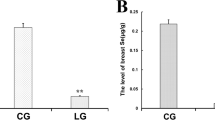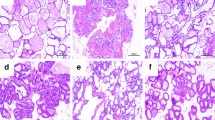Abstract
Selenium (Se) is an essential micronutrient that plays a critical role in anti-inflammatory processes and antioxidant defense system. In this study, we investigated the effects of dietary selenium deficiency on lipopolysaccharide (LPS)-induced mastitis in mouse models. Se content in the liver was assessed by fluorescent atomic absorption spectrometry. Glutathione peroxidase (GPx) activity in the blood, myeloperoxidase (MPO) activity, tumor necrosis actor alpha (TNF-α), and interleukin (IL)-1β in the supernatant of the mammary tissue were determined according to the corresponding kits. Cyclooxygenase-2 (COX-2) and inducible nitric oxide synthase (iNOS) expressions were evaluated by Western blotting. The results showed that the Se-deficient mouse model was successfully replicated, and selenium deficiency exacerbated mammary gland histopathology, increased the expressions of TNF-α and IL-1β, and facilitated the activation of iNOS and COX-2 in LPS-induced mouse mastitis. In conclusion, our studies demonstrated that selenium deficiency resulted in more severe inflammatory response in LPS-induced mouse mastitis.





Similar content being viewed by others
REFERENCES
Ruegg, P.L. 2003. Investigation of mastitis problems on farms. Veterinary Clinics of North America. Food Animal Practice 19: 47–73.
Andrieu, S. 2008. Is there a role for organic trace element supplements in transition cow health? The Veterinary Journal 176: 77–83.
Medzhitov, R., and C.A. Janeway. 1997. Innate immunity: the virtues of a nonclonal system of recognition. Cell 91: 295–298.
Kauf, A.C., B.T. Vinyard, and D.D. Bannerman. 2007. Effect of intramammary infusion of bacterial lipopolysaccharide on experimentally induced Staphylococcus aureus intramammary infection. Research in Veterinary Science 82: 39–46.
Li, D., N. Zhang, Y. Cao, W. Zhang, G. Su, Y. Sun, et al. 2013. Emodin ameliorates lipopolysaccharide-induced mastitis in mice by inhibiting activation of NF-κB and MAPKs signal pathways. European Journal of Pharmacology 705: 79–85.
Hoffmann, P.R., and M.J. Berry. 2008. The influence of selenium on immune responses. Molecular Nutrition & Food Research 52: 1273–1280.
Duntas, L. 2009. Selenium and inflammation: underlying anti-inflammatory mechanisms. Hormone and Metabolic Research 41: 443–447.
Holben, D.H., and A.M. Smith. 1999. The diverse role of selenium within selenoproteins: a review. Journal of the American Dietetic Association 99: 836–843.
Allan, C.B., G.M. Lacourciere, and T.C. Stadtman. 1999. Responsiveness of selenoproteins to dietary selenium 1, 2. Annual Review of Nutrition 19: 1–16.
Gu, B. 1983. Pathology of Keshan disease. A comprehensive review. Chinese Medical Journal 96: 251–261.
Rayman, M.P. 2000. The importance of selenium to human health. The Lancet 356: 233–241.
Loef, M., G.N. Schrauzer, and H. Walach. 2011. Selenium and Alzheimer’s disease: a systematic review. Journal of Alzheimer's Disease 26: 81–104.
Barrett, C.W., K. Singh, A.K. Motley, M.K. Lintel, E. Matafonova, A.M. Bradley, et al. 2013. Dietary selenium deficiency exacerbates DSS-induced epithelial injury and AOM/DSS-induced tumorigenesis. PLoS ONE 8: e67845.
Zhang W, Zhang R, Wang T, Jiang H, Guo M, and Zhou E, et al. 2014. Selenium inhibits LPS-induced pro-inflammatory gene expression by modulating MAPK and NF-κB signaling pathways in mouse mammary epithelial cells in primary culture. Inflammation: 37: 478–485.
Hasunuma, R., T. Ogawa, and Y. Kawanishi. 1982. Fluorometric determination of selenium in nanogram amounts in biological materials using 2, 3-diaminonaphthalene. Analytical Biochemistry 126: 242–245.
Lawrence, R.A., and R.F. Burk. 1978. Species, tissue and subcellular distribution of non Se-dependent glutathione peroxidase activity. The Journal of Nutrition 108: 211–215.
Krawisz, J., P. Sharon, and W. Stenson. 1984. Quantitative assay for acute intestinal inflammation based on myeloperoxidase activity. Gastroenterology 87: 1344–1350.
Deby-Dupont, G., C. Deby, and M. Lamy. 1999. Neutrophil myeloperoxidase revisited: it’s role in health and disease. Intensivmedizin und Notfallmedizin 36: 500–513.
Khairova, R.A., R. Machado-Vieira, J. Du, and H.K. Manji. 2009. A potential role for pro-inflammatory cytokines in regulating synaptic plasticity in major depressive disorder. The International Journal of Neuropsychopharmacology 12: 561–578.
Fu, Y., B. Liu, N. Zhang, Z. Liu, D. Liang, F. Li, et al. 2013. Magnolol inhibits lipopolysaccharide-induced inflammatory response by interfering with TLR4 mediated NF-κB and MAPKs signaling pathways. Journal of Ethnopharmacology 145: 193–199.
Buraczynska, M., P. Ksiazek, P. Kubit, and W. Zaluska. 2006. Interleukin-1 receptor antagonist gene polymorphism affects the progression of chronic renal failure. Cytokine 36: 167–172.
Vunta, H., B.J. Belda, R.J. Arner, C. Channa Reddy, J.P. Vanden Heuvel, and K. Sandeep Prabhu. 2008. Selenium attenuates pro-inflammatory gene expression in macrophages. Molecular Nutrition & Food Research 52: 1316–1323.
Surh, Y.-J., K.-S. Chun, H.-H. Cha, S.S. Han, Y.-S. Keum, K.-K. Park, et al. 2001. Molecular mechanisms underlying chemopreventive activities of anti-inflammatory phytochemicals: down-regulation of COX-2 and iNOS through suppression of NF-κB activation. Mutation Research: Fundamental and Molecular Mechanisms of Mutagenesis 480: 243–268.
Takahashi, M., M. Mutoh, T. Kawamori, T. Sugimura, and K. Wakabayashi. 2000. Altered expression of β-catenin, inducible nitric oxide synthase and cyclooxygenase-2 in azoxymethane-induced rat colon carcinogenesis. Carcinogenesis 21: 1319–1327.
Vane, J.R., J.A. Mitchell, I. Appleton, A. Tomlinson, D. Bishop-Bailey, J. Croxtall, et al. 1994. Inducible isoforms of cyclooxygenase and nitric-oxide synthase in inflammation. Proceedings of the National Academy of Sciences 91: 2046–2050.
Zamamiri-Davis, F., Y. Lu, J.T. Thompson, K.S. Prabhu, P.V. Reddy, L.M. Sordillo, et al. 2002. Nuclear factor-κB mediates over-expression of cyclooxygenase-2 during activation of RAW 264.7 macrophages in selenium deficiency. Free Radical Biology and Medicine 32: 890–897.
Prabhu, K., F. Zamamiri-Davis, J. Stewart, J. Thompson, L. Sordillo, and C. Reddy. 2002. Selenium deficiency increases the expression of inducible nitric oxide synthase in RAW 264.7 macrophages: role of nuclear factor-κB in up-regulation. Biochemical Journal 366: 203–209.
ACKNOWLEDGMENTS
This study was supported by China Postdoctoral Science Foundation (2013M540255).
Author information
Authors and Affiliations
Corresponding author
Rights and permissions
About this article
Cite this article
Wei, Z., Yao, M., Li, Y. et al. Dietary Selenium Deficiency Exacerbates Lipopolysaccharide-Induced Inflammatory Response in Mouse Mastitis Models. Inflammation 37, 1925–1931 (2014). https://doi.org/10.1007/s10753-014-9925-y
Published:
Issue Date:
DOI: https://doi.org/10.1007/s10753-014-9925-y




